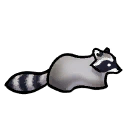Difference between revisions of "Raccoon"
(Guessing intended meaning of sentence. also minor copy editing) |
|||
| Line 61: | Line 61: | ||
As hunting game, they yield about 50% more meat and leather than the smallest RimWorld animals (the [[hare]], [[squirrel]], and [[rat]]), but still provide meager return. If you have nothing else in the winter, you might have no option but to hunt them. | As hunting game, they yield about 50% more meat and leather than the smallest RimWorld animals (the [[hare]], [[squirrel]], and [[rat]]), but still provide meager return. If you have nothing else in the winter, you might have no option but to hunt them. | ||
| − | As tamed animals, raccoons offer practically no niche. They gestate slower and lose tameness faster than [[ | + | As tamed animals, raccoons offer practically no niche. They gestate slower and lose tameness faster than [[rat]]s. Rats are also omnivorous grazers. You can find rats in every [[biome]] that raccoons appear in, and rats are more common than racoons. As bait animals, rats are smaller (harder to hit), reproduce faster, and eat less. |
==Training== | ==Training== | ||
Revision as of 12:39, 28 February 2023
Raccoon
A small, hardy animal that ranges wide across forests and shrubland. It is happy to break into your garbage container, or your kitchen, to eat almost anything.
Base Stats
- Type
- Animal
- Flammability
- 70%
Pawn Stats
- Move Speed
- 4.1 c/s
- Health Scale
- 40% HP
- Body Size
- 0.4
- Mass - Baby
- 4.8 kg
- Mass - Juvenile
- 12 kg
- Mass - Adult
- 24 kg
- Carrying Capacity
- 30 kg
- Filth Rate
- 4
- Hunger Rate
- 0.32 Nutrition/Day
- Diet
- omnivorous grazer
- Life Expectancy
- 8 years
- Manhunter Chance
- 0%
- Manhunter Chance (Taming)
- 0%
- Trainable Intelligence
- None
- Wildness
- 75%
- Minimum Handling Skill
- 7
- Mate Interval
- 8 hours
- Maturity Age
- 0.222 years (13.3 days)
- Juvenile Age
- 0.1 years (6 days)
- Comfortable Temp Range
- -30 °C – 40 °C (-22 °F – 104 °F)
Production
- Meat Yield
- 56
 raccoon meat
raccoon meat - Leather Yield
- 22
 lightleather
lightleather - Gestation Period
- 5.661 days
- Offspring Per Birth
- 1-2 (1.5 avg)
Melee Combat
- Attack 1
- Front left paw
6 dmg (Scratch)
9 % AP
2 second cooldown - Attack 2
- Front right paw
6 dmg (Scratch)
9 % AP
2 second cooldown - Attack 3
- Teeth
7 dmg (Bite)
10 % AP
2 second cooldown
0.7 chance factor - Attack 4
- Head
3 dmg (Blunt)
4 % AP
2 second cooldown
0.2 chance factor - Average DPS
- 1.71
- tradeTags
- AnimalCommon
The raccoon is a small ground mammal which scavenges for most of its food.
They can be found in temperate forests, temperate swamps, boreal forests, and cold bogs
Summary
Raccoons have 80% Toxic Environment Resistance rendering them highly resistant to environmental effects such as rot stink and toxic buildup from non-attack sources.
Analysis
Raccoons are mostly there as small manhunter threats for your small manhunter events. For the first manhunter event in the game, racoons are about the largest animal you'll get. They can also appear in the low end of caravan ambushes, or in the Noble wimp![]() quest. During the winter, racoons will often eat any of your exposed food you have available.
quest. During the winter, racoons will often eat any of your exposed food you have available.
As hunting game, they yield about 50% more meat and leather than the smallest RimWorld animals (the hare, squirrel, and rat), but still provide meager return. If you have nothing else in the winter, you might have no option but to hunt them.
As tamed animals, raccoons offer practically no niche. They gestate slower and lose tameness faster than rats. Rats are also omnivorous grazers. You can find rats in every biome that raccoons appear in, and rats are more common than racoons. As bait animals, rats are smaller (harder to hit), reproduce faster, and eat less.
Training
This animal can be trained as follows:
| Guard: | |
|---|---|
| Attack: | |
| Rescue: | |
| Haul: | |
*As of version 1.1.2610, all animals can be tamed. The percentage of likelihood of success depends on factors such as the Animals Wildness Percentage, Pawn Handling Skill, and others. More information can be found on the animals page.
Health
